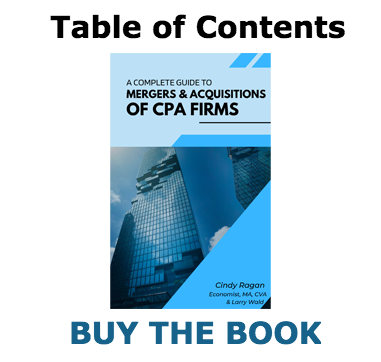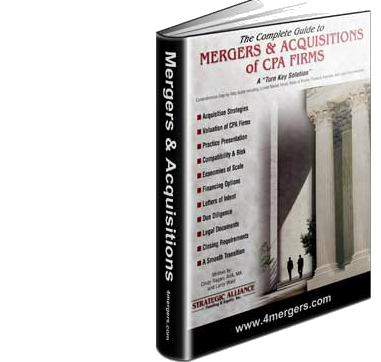Frequently Asked Questions…
Analyzing the Opportunity
- How does one value the practice in terms of services, rates, realization, infrastructure and client base?
- What specific economies of scale might be achieved by combining the practices?
- Who in the buyer’s firm is going to replace the seller’s relationship with the clients as “rainmaker” after the seller’s exit?
- If the seller is staying on and builds the practice should new clients built from the seller’s practice be valued as referrals or be considered part of the multiple?
- Are the fundamental services of both buyer and seller compatible for growth?
- Does aggressive versus conservative tax preparation style affect each side?
- Does the way the work gets to the office affect the value of the practice?
- What is the buyer’s exit strategy?
- How do both feel about providing financial services to the client base?
- What should both sides be looking at during due diligence?
- How long should you open up your practice for due diligence and at what point?
- When does proof of cash to close become necessary?
- What matters should be covered in a Letter of Intent?
Establishing the Purchase Price
- What is a fair and equitable down payment?
- What is a fair multiple of revenue for establishing the purchase price?
- How many years should the purchase price be adjusted based collections?
- Should there be a minimum and maximum to the adjustments to the purchase price?
- Should the seller get paid more if the collections go up?
- Should the tangible assets (FF&E) of the practice be included in the purchase price?
- What is a fair method of allocating the purchase price within IRS rules?
- How much of the purchase price should be allocated to capital gains versus ordinary income?
- How long should the term of payout be for Seller financing? 3 years? 5 years? 7 years?
- How should accounts receivable and work in process be handled?
- With an adjustable purchase price financed by the seller based on collections, should there also be interest on the note?
- When is non-recurring revenue considered recurring?
- Should the payout be matched with cash flow?
- How does the cash flow affect the payout?
- Does the cash flow support the debt service, the salaries of the sellers, and the overhead? Does the return on investment sufficiently support the purchase price?
- What is the relationship of the billings versus collections to the realization rate over the last 12 months and previous years?
- How should the real profit/owner’s income be quantified as part of the value being sold?
- What if real estate is involved in the transaction? How does it affect the value?
Obtaining Financing
- Can the purchase be financed through a lending institution?
- What would be reasonable terms & conditions of the loan?
- Can the down payment be financed?
- What information and documents will be required by the lending institution?
Negotiating the Contract
- In what areas should the buyer indemnify the seller?
- Which side should create the purchase and sale agreement?
- What other instruments should the buyer provide beyond a personal guarantee to secure the note?
- What are the normal exhibits and attachments to the purchase and sale agreement?
- What language should the purchase and sale agreements have to be fair?
- What specific issues belong in the letter of intent?
- Should the seller’s name of the firm be included with the buyer’s on the name of the new entity? (Even in a full acquisition?)
- What representations and warrantees should be considered in the purchase and sale agreement?
- How long should the non-compete be for and in what geographical area?
- What assets of the seller can be protected by a Form UCC-1 filing?
Transitioning the Practice
- What is the most effective method for transitioning all the clients and maximizing the payout?
- How long after the closing should monthly payments start for the buyer?
- What is a fair compensation for the seller?
- Should the seller be paid as an employee or independent contractor?
- How long should the employment agreement be for?
- What should the seller’s liabilities be after the closing?
- How long should the seller be required to stay?
- How many non-billable hours should the seller donate to the buyer for the transition?
- How much training should the seller provide for introductions and review of files?
- What is the best way to handle the lease; sub-lease, assign it, or create a new one?
- When is the best time to disclose to the employees the plans of the company?
- What role can the consultant/broker play after the closing?
- How much are closing costs and who pays these costs?






